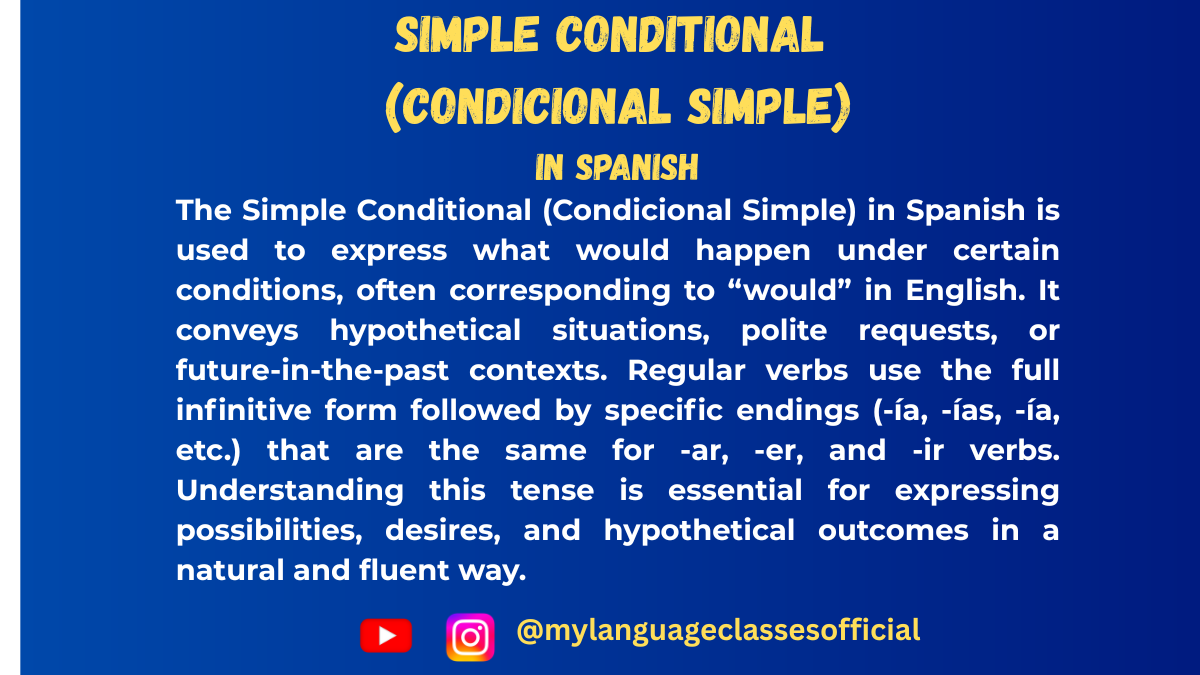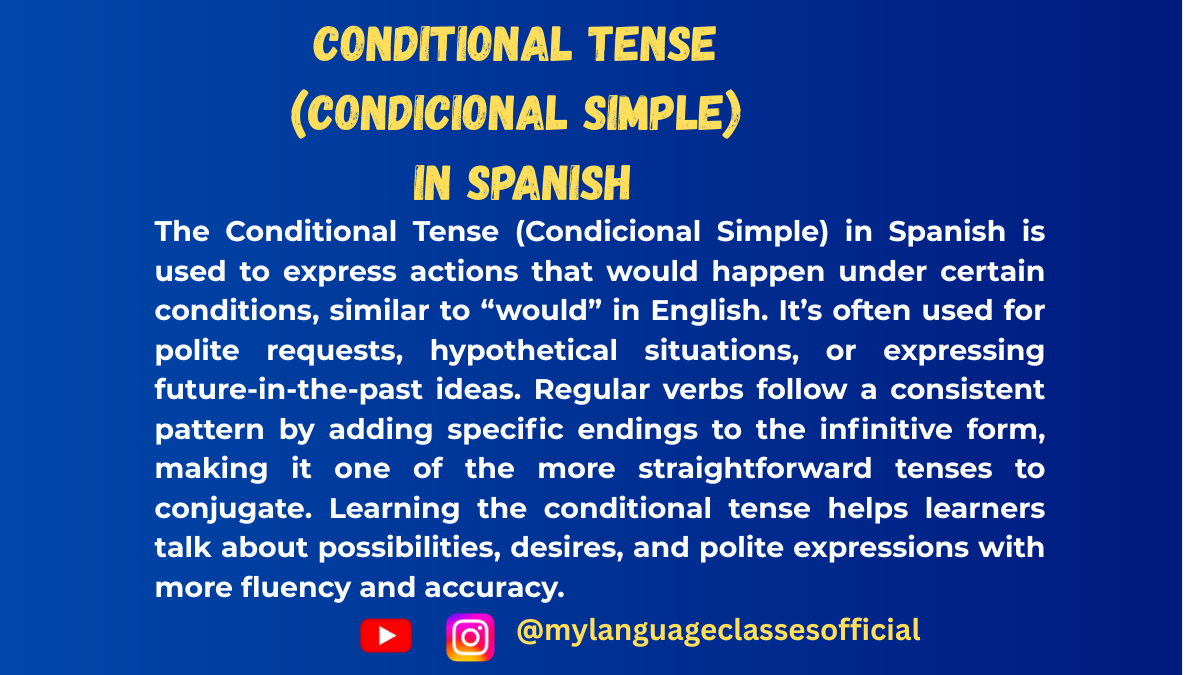Your cart is currently empty!
Tag: Spanish conditional tense regular and irregular verbs
-

Simple Conditional (Condicional Simple) Tense/Mode in Spanish
The Simple Conditional tense, known as “Condicional Simple” in Spanish, is used to express actions that would happen under certain conditions. It is equivalent to the English “would” form of verbs. This tense is commonly used to express hypothetical situations, polite requests, desires, and conjectures about the past. Understanding the Simple Conditional is essential for fluency in Spanish as it appears frequently in everyday conversations and formal writing.
Common Expressions Using Simple Conditional
Here are some common expressions that use the Simple Conditional tense in Spanish along with their meanings:
- Me gustaría – I would like
- Podrías ayudarme? – Could you help me?
- Deberías estudiar más. – You should study more.
- Sería mejor si… – It would be better if…
- Me encantaría ir contigo. – I would love to go with you.
- Habría sido un buen día. – It would have been a good day.
- Tendrías tiempo para hablar? – Would you have time to talk?
- Querría saber más sobre esto. – I would like to know more about this.
- Si fuera posible, viajaría por todo el mundo. – If it were possible, I would travel around the world.
- No harías eso, ¿verdad? – You wouldn’t do that, right?
Things to Keep in Mind
- Articles and Gender: As with other tenses in Spanish, the gender and number of nouns remain unchanged in the conditional tense.
- Pronouns: Indirect and direct object pronouns are placed before the conjugated verb.
- Regular vs. Irregular Verbs: While most verbs follow a predictable conjugation pattern, there are several irregular verbs that require memorization.
- Plural Forms: The conditional tense applies to singular and plural subjects without changing the verb stem.
- Politeness: This tense is commonly used for polite requests and suggestions.
When to Use
The Simple Conditional is used in the following situations:
- Hypothetical Situations:
- Si tuviera más dinero, compraría un coche. (If I had more money, I would buy a car.)
- Polite Requests:
- Podrías cerrar la ventana, por favor? (Could you close the window, please?)
- Suggestions and Advice:
- Deberías dormir más. (You should sleep more.)
- Desires and Preferences:
- Me encantaría visitar España. (I would love to visit Spain.)
- Speculation about the Past:
- Sería alrededor de las 8 cuando llegó. (It must have been around 8 when he arrived.)
Conjugation of Regular Verbs
To form the Simple Conditional tense, take the infinitive verb and add the following endings for all three verb categories (-AR, -ER, -IR):
Subject Ending Yo -ía Tú -ías Él/Ella/Usted -ía Nosotros/as -íamos Vosotros/as -íais Ellos/Ellas/Ustedes -ían
Example of Regular Verb Conjugation:
- Hablar (to speak) → hablaría, hablarías, hablaría, hablaríamos, hablaríais, hablarían
- Comer (to eat) → comería, comerías, comería, comeríamos, comeríais, comerían
- Vivir (to live) → viviría, vivirías, viviría, viviríamos, viviríais, vivirían
Irregular Verbs and Their Conjugation
Some verbs have irregular stems in the Simple Conditional tense. Here are common irregular verbs:
Infinitive Stem Change Example (Yo form) Tener (to have) tendr- tendría Poder (to be able to) podr- podría Hacer (to do/make) har- haría Decir (to say) dir- diría Venir (to come) vendr- vendría Poner (to put) pondr- pondría Saber (to know) sabr- sabría Salir (to leave) saldr- saldría Querer (to want) querr- querría Haber (to have – auxiliary) habr- habría Example Sentences:
- Tendría más tiempo si terminara mi trabajo temprano. (I would have more time if I finished my work early.)
- Diría la verdad si me preguntaras. (I would tell the truth if you asked me.)
Regular Verbs in Simple Conditional
Verb Meaning Example 1 (Spanish) Meaning (English) Example 2 (Spanish) Meaning (English) Hablar To speak Hablaría con ella. I would speak with her. Hablaríamos sobre el tema. We would talk about the topic. Comer To eat Comeríamos en un restaurante. We would eat in a restaurant. Comería menos azúcar. I would eat less sugar. Vivir To live Viviríamos en España. We would live in Spain. Viviría en la playa. I would live at the beach. Trabajar To work Trabajaría más horas. I would work more hours. Trabajaríamos juntos. We would work together. Estudiar To study Estudiaría francés. I would study French. Estudiaríamos historia. We would study history. Viajar To travel Viajaría a México. I would travel to Mexico. Viajaríamos en verano. We would travel in summer. Escuchar To listen Escucharía música. I would listen to music. Escucharíamos el concierto. We would listen to the concert. Aprender To learn Aprendería a nadar. I would learn to swim. Aprenderíamos japonés. We would learn Japanese. Escribir To write Escribiría una carta. I would write a letter. Escribiríamos un libro. We would write a book. Comprar To buy Compraría un coche. I would buy a car. Compraríamos una casa. We would buy a house.
More Example Sentences
- Me encantaría viajar a Japón el próximo año. (I would love to travel to Japan next year.)
- Si tuvieras tiempo, iríamos al cine juntos. (If you had time, we would go to the movies together.)
- ¿Qué harías si fueras el presidente del país? (What would you do if you were the president of the country?)
- Juan dijo que llamaría más tarde. (Juan said he would call later.)
- En su lugar, yo no diría nada. (In his place, I wouldn’t say anything.)
- Mis abuelos vivirían en la playa si pudieran. (My grandparents would live at the beach if they could.)
- ¿Podrías ayudarme con esta tarea? (Could you help me with this homework?)
- Nosotros compraríamos una casa más grande si tuviéramos más dinero. (We would buy a bigger house if we had more money.)
- Ella nunca mentiría a sus amigos. (She would never lie to her friends.)
- Si hiciera sol, saldríamos a caminar. (If it were sunny, we would go for a walk.)
Fill in the Blanks:
- Si tuviera más dinero, ______ (comprar) un coche nuevo.
- ¿Qué ______ (hacer) tú si ganaras la lotería?
- Nosotros ______ (viajar) por todo el mundo si pudiéramos.
- Ella dijo que ______ (venir) a la fiesta, pero no pudo.
- En tu lugar, yo no ______ (decir) nada sobre el asunto.
- Mis padres me prometieron que me ______ (dar) un regalo especial para mi cumpleaños.
- Si fueras famoso, ¿con quién ______ (trabajar)?
- Ustedes ______ (poder) aprender español más rápido si practicaran todos los días.
- Juan ______ (querer) aprender otro idioma, pero no tiene tiempo.
- Si hiciera buen tiempo, nosotros ______ (salir) a pasear.
Answers
- compraría
- harías
- viajaríamos
- vendría
- diría
- darían
- trabajarías
- podrían
- querría
- saldríamos
Conclusion
Mastering the Simple Conditional tense in Spanish is crucial for expressing hypothetical situations, politeness, and speculations. By understanding its conjugations, irregular forms, and common expressions, you can enhance your fluency and confidence in Spanish conversations.
If you enjoyed this lesson, be sure to check out more posts like this on my blog at My Language Classes. Don’t forget to subscribe my YouTube channel and follow me on Instagram for the latest language learning tips and lessons. Leave a comment below to share your thoughts, or ask any questions you have about nouns.
Happy learning! 😊
📚 Continue Learning Spanish
-

Spanish Conditional Tense (Condicional Simple)
Spanish Conditional Tense (Condicional Simple)
The Conditional tense in Spanish, also known as Condicional Simple, is essential for expressing hypothetical situations, polite requests, advice, or possibilities. It is equivalent to “would” in English and plays a crucial role in day-to-day conversations.
Situations Where Conditional Tense is Used
- Hypothetical Situations
Express unreal or imagined scenarios.
Example:- Si tuviera dinero, viajaría por el mundo.
(If I had money, I would travel the world.)
- Si tuviera dinero, viajaría por el mundo.
- Polite Requests
Used to make polite or formal requests.
Example:- ¿Podrías ayudarme con esto?
(Could you help me with this?)
- ¿Podrías ayudarme con esto?
- Suggestions and Advice
To give recommendations in a softer tone.
Example:- Yo que tú, estudiaría más.
(If I were you, I would study more.)
- Yo que tú, estudiaría más.
- Expressing Desires or Wishes
When talking about what one would like.
Example:- Me gustaría aprender a bailar salsa.
(I would like to learn how to dance salsa.)
- Me gustaría aprender a bailar salsa.
- Future in the Past
When talking about a future action from the perspective of the past.
Example:- Dijo que llamaría después.
(He said he would call later.)
- Dijo que llamaría después.
How to Form the Conditional Tense
1. Regular Verbs
The Conditional tense for regular verbs is formed by adding specific endings to the infinitive form of the verb. These endings are the same for all three conjugations (-ar, -er, -ir).
Endings:
-ía, -ías, -ía, -íamos, -íais, -ían
Examples:
- Hablar (to talk)
- Yo hablaría (I would talk)
- Tú hablarías (You would talk)
- Él/Ella/Usted hablaría (He/She/You would talk)
- Nosotros hablaríamos (We would talk)
- Vosotros hablaríais (You all would talk)
- Ellos/Ellas/Ustedes hablarían (They/You all would talk)
- Comer (to eat)
- Yo comería (I would eat)
- Vivir (to live)
- Yo viviría (I would live)
2. Irregular Verbs
Irregular verbs in the Conditional tense have stem changes, but they use the same endings as regular verbs.
Common Irregular Verbs:
Infinitive Stem Change Conditional Form Example Tener Tendr- Tendría (I would have) Poder Podr- Podría (I could) Venir Vendr- Vendría (I would come) Decir Dir- Diría (I would say) Hacer Har- Haría (I would do/make) Querer Querr- Querría (I would want) Saber Sabr- Sabría (I would know)
Common Expressions in Conditional Tense
- Polite Phrases:
- ¿Podrías ayudarme? (Could you help me?)
- Me encantaría ir contigo. (I would love to go with you.)
- Suggestions:
- Deberías estudiar más. (You should study more.)
- Yo que tú, lo haría. (If I were you, I would do it.)
- Hypotheticals:
- Si fuera rico, viajaría mucho. (If I were rich, I would travel a lot.)
- ¿Qué harías en mi lugar? (What would you do in my place?)
- Future in the Past:
- Ella prometió que vendría temprano. (She promised she would come early.)
Key Considerations:
- Articles and Gender:
Ensure agreement between articles and nouns:- El coche sería rápido. (The car would be fast.)
- La casa estaría lista. (The house would be ready.)
- Plurality:
Match subjects and verbs in number:- Singular: Ella diría. (She would say.)
- Plural: Ellos dirían. (They would say.)
Practice Sentences
- Si tuviera más tiempo, leería más libros.
(If I had more time, I would read more books.) - Nos encantaría visitar España algún día.
(We would love to visit Spain someday.) - ¿Qué harías si ganaras la lotería?
(What would you do if you won the lottery?) - Yo en tu lugar, hablaría con el jefe.
(If I were you, I would talk to the boss.)
Mastering the Conditional tense in Spanish opens up a world of nuanced expression. With practice, you’ll be able to convey politeness, share hypotheticals, and provide advice effortlessly!
If you found this guide helpful, I’d love to hear from you! Share your thoughts in the comments below or connect with me on social media. For more tips, resources, and inspiration, visit my blog at mylanguageclasses.in. Follow on Instagram and subscribe on YouTube
📚 Continue Learning Spanish
- Hypothetical Situations
